|
Upcoming Events
Roundtable on ‘The Current Science and Technology Landscape of Climate Change
and Environmental Security in the Asia Pacific Region’
Bangladesh Institute of Peace and Security Studies (BIPSS)
20 June 2011
Dhaka, Bangladesh
This roundtable, to be chaired by BIPSS President, Maj. Gen. Muniruzzaman (Retd), will see Dr J. Scott Haugher, Associate Professor in the Asia-Pacific Center for Security Studies (APCSS), deliver a presentation on ‘The Current Science and Technology Landscape of Climate Change and Environmental Security in the Asia Pacific Region’. The presentation will be followed by a question-and-answer session, with concluding remarks delivered by Maj. Gen. Muniruzzaman.
Dr Haugher’s expertise is in the areas of science, technology and society; global change and environmental security; science diplomacy; barriers to international research collaboration; and innovation theory, policy and practices. He has been involved in research and innovation enterprise across private, academic, non-profit and government sectors. He is also the editor of a book on American academic research competitiveness, and has published a variety of articles and book chapters on science policy topics, as well as innovation theory and practice.
Please email info@bipss.org.bd to register your interest in the roundtable.
^ To the top
Announcements
Job Vacancy for Post of Senior Analyst/Associate Research Fellow at the RSIS Centre for NTS Studies
The RSIS Centre for Non-Traditional Security (NTS) Studies is seeking a Senior Analyst/Associate Research Fellow in the Climate Change, Environmental Security and Natural Disasters, and Food Security Programmes. The successful candidate will be expected to play an active role in formulating and carrying out research projects, helping to arrange conferences, workshops and other outreach events, and completing organisational and administrative tasks relating to the Centre’s publication and outreach agendas.
Applicants should possess a Master’s degree with strong English academic writing skills, be an effective speaker comfortable presenting to a diverse range of audiences, and have demonstrable experience and/or expertise in the fields of environmental security and climate change, and/or food security. Experience and/or expertise geared towards the East and Southeast Asian regions are preferred. A willingness to work in a structured team environment with ambitious output commitments and firm deadlines is a must.
Please submit a detailed CV together with our ‘Application for Employment’ form to the Head of Administration. Click here to download the form.
Applications are to be sent via post, fax or email to:
Head of Administration
S. Rajaratnam School of International Studies
Nanyang Technological University
Block S4, Level B4, Nanyang Avenue, Singapore 639798
Fax: (65) 6794-0617
Email: rsisrecruitment@ntu.edu.sg
The review of applications will begin immediately and will continue until the position is filled. Only shortlisted candidates will be notified.
RCSS Invites Applications for the Post of Executive Director
 The Regional Centre for Strategic Studies (RCSS) invites applications for the position of Executive Director. The successful candidate is expected to assume the position from 3 January 2012. The desired candidate should fulfill the following criteria: The Regional Centre for Strategic Studies (RCSS) invites applications for the position of Executive Director. The successful candidate is expected to assume the position from 3 January 2012. The desired candidate should fulfill the following criteria:
- Preferably 35–60 years of age
- Possess an advanced degree, preferably a PhD in international relations, political science or related social science subjects
- Have a scholarly reputation with substantial publications
- Possess proven managerial and administrative skills, and the ability to reach out to various constituencies in security-related fields in South Asia and abroad
- Possess the ability to raise funds both regionally and internationally
The position is open to citizens of Afghanistan, Bangladesh, Bhutan, India, Maldives, Nepal and Pakistan. The tenure is for a fixed and non-extendable term of three years. The selected person will be paid an all-inclusive monthly salary of US$4,000 and be given two return economy plane tickets (for the Executive Director and his/her spouse).
Eligible candidates are encouraged to send in a complete CV including the names of two non-related referees. Applicants should submit a 500-word letter describing how his/her experience will be relevant to the job and how he/she would be able to contribute to the work of RCSS.
The deadline for submissions is Friday, 15 July 2011. Only shortlisted candidates will be contacted for an interview.
Applications must be sent via registered post, courier or email to:
Secretary
Regional Centre for Strategic Studies (RCSS)
68/1, Sarasavi Lane
Colombo 08
Sri Lanka
Email rcss@rcss.org
Click here for more information about this position.
BIPSS and APCSS Create Community of Interest on Climate Security
 The Bangladesh Institute of Peace and Security Studies (BIPSS) and the Asia Pacific Centre for Security Studies (APCSS) have jointly created an online Community of Interest (COI) on Climate Change and Security. This new COI is aimed at enhancing the understanding of the security implications of climate change and creating an epistemic community on the subject. The COI will be jointly led by BIPSS President Maj. Gen. Muniruzzaman (Retd) and Dr Scott Haugher from APCSS. The Bangladesh Institute of Peace and Security Studies (BIPSS) and the Asia Pacific Centre for Security Studies (APCSS) have jointly created an online Community of Interest (COI) on Climate Change and Security. This new COI is aimed at enhancing the understanding of the security implications of climate change and creating an epistemic community on the subject. The COI will be jointly led by BIPSS President Maj. Gen. Muniruzzaman (Retd) and Dr Scott Haugher from APCSS.
Abstract Deadline Extended for International Food Security Conference
 The organising committee for the upcoming International Conference on Asian Food Security (ICAFS) is pleased to announce that it has extended the deadline for abstract submissions in response to continuing public interest. Abstracts will be accepted up until Friday, 17 June and responded to by Monday 4 July 2011. For more information on ICAFS including abstract submission and registration guidelines, please click here. The organising committee for the upcoming International Conference on Asian Food Security (ICAFS) is pleased to announce that it has extended the deadline for abstract submissions in response to continuing public interest. Abstracts will be accepted up until Friday, 17 June and responded to by Monday 4 July 2011. For more information on ICAFS including abstract submission and registration guidelines, please click here.
Organised by the RSIS Centre for NTS Studies, ICAFS will be held from 10–12 August 2011 at the Grand Copthorne Hotel, Singapore. This is the first international food security conference of its kind to be held in Asia.
BIPSS Launches a Major Research Project on Water Security
 Bangladesh Institute of Peace and Security Studies (BIPSS), in association with the Peace Research Institute Oslo (PRIO), launched a major research project on ‘Water Scarcity in Bangladesh and South Asia: Examining Dynamics of Conflict and Cooperation’. As Bangladesh is facing serious threats of water stress, with implications for regional security and development, the proposed project will fill knowledge gaps related to water security and promote information-sharing on water between Bangladesh, India and Nepal. The project is supported by the Norwegian government. BIPSS President Maj. Gen. Muniruzzman (Retd) and BIPSS Advisor on Communications and Research Dr Hamiduzzaman will be attending the first meeting of this project in Oslo, Norway. During the meeting, Maj. Gen. Muniruzzaman will share his thoughts about the water scarcity situation in Bangladesh and South Asia. Bangladesh Institute of Peace and Security Studies (BIPSS), in association with the Peace Research Institute Oslo (PRIO), launched a major research project on ‘Water Scarcity in Bangladesh and South Asia: Examining Dynamics of Conflict and Cooperation’. As Bangladesh is facing serious threats of water stress, with implications for regional security and development, the proposed project will fill knowledge gaps related to water security and promote information-sharing on water between Bangladesh, India and Nepal. The project is supported by the Norwegian government. BIPSS President Maj. Gen. Muniruzzman (Retd) and BIPSS Advisor on Communications and Research Dr Hamiduzzaman will be attending the first meeting of this project in Oslo, Norway. During the meeting, Maj. Gen. Muniruzzaman will share his thoughts about the water scarcity situation in Bangladesh and South Asia.
Click here for more information on this project. |
^ To the top
Recent Events
Study Group Meeting and Seminar on
‘Climate Change, Migration and Human Security in Southeast Asia’
RSIS Centre for Non-Traditional Security (NTS) Studies
26–27 May 2011
Singapore
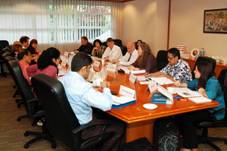 The RSIS Centre for NTS Studies organised a Study Group Meeting on ‘Climate Change, Migration and Human Security in Southeast Asia’ on 26–27 May 2011 in Singapore. Funded by the MacArthur Foundation, this study group aimed to examine the nature of possible climate-change-induced migration in the region; to consider whether this is also a security issue (and, if so, for whom); and to investigate how security consequences, particularly human security consequences, can be managed. The study group meeting sought to do the following: identify and analyse current evidence on climate change and displacement of people and communities in Southeast Asia; assess human insecurities caused by climate-change-induced migration including impacts on livelihoods and income, loss of social capital, impact on traditional coping mechanisms, impact on already marginalised groups; and explore governance and institutional approaches that can support strategies to anticipate, prevent and, where necessary, manage climate-change-induced migration. The RSIS Centre for NTS Studies organised a Study Group Meeting on ‘Climate Change, Migration and Human Security in Southeast Asia’ on 26–27 May 2011 in Singapore. Funded by the MacArthur Foundation, this study group aimed to examine the nature of possible climate-change-induced migration in the region; to consider whether this is also a security issue (and, if so, for whom); and to investigate how security consequences, particularly human security consequences, can be managed. The study group meeting sought to do the following: identify and analyse current evidence on climate change and displacement of people and communities in Southeast Asia; assess human insecurities caused by climate-change-induced migration including impacts on livelihoods and income, loss of social capital, impact on traditional coping mechanisms, impact on already marginalised groups; and explore governance and institutional approaches that can support strategies to anticipate, prevent and, where necessary, manage climate-change-induced migration.
In addition, a public seminar was held on the morning of 27 May, at which selected participants were invited to speak on the issues that they have raised during the study group meeting.
Click here for the study group meeting programme.
Click here for more information on the public seminar.
BIISS-IDSA Bilateral Dialogue on
‘Four Decades of India-Bangladesh Relations: What Lies Ahead?’
Bangladesh Institute of International and Strategic Studies (BIISS)
9–10 May 2011
New Delhi, India
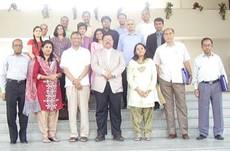 A six-member delegation from BIISS, led by Maj. Gen. Muhammad Imrul Quayes, ndc, psc, participated in the BIISS-IDSA (Bangladesh Institute of International and Strategic Studies-Institute for Defence Studies and Analyses) Bilateral Dialogue on ‘Four Decades of India-Bangladesh Relations: What Lies Ahead?’ on 9–10 May 2011, in IDSA, New Delhi. Presentations delivered by participants from Bangladesh and India focused on six themes. The themes were ‘South Asia and the International Order’, ‘Challenges to the Regional Security’, ‘Indo-Bangladesh Trade: Challenges and Opportunities’, ‘Connectivity and Infrastructural Cooperation’, ‘Cooperation on Water and Energy Issues’ and ‘Security Dynamics and Indo-Bangladesh Relations’. In the concluding session, a roundtable discussion was held on ‘Re-appraising India-Bangladesh Relations: A Way Forward’. A six-member delegation from BIISS, led by Maj. Gen. Muhammad Imrul Quayes, ndc, psc, participated in the BIISS-IDSA (Bangladesh Institute of International and Strategic Studies-Institute for Defence Studies and Analyses) Bilateral Dialogue on ‘Four Decades of India-Bangladesh Relations: What Lies Ahead?’ on 9–10 May 2011, in IDSA, New Delhi. Presentations delivered by participants from Bangladesh and India focused on six themes. The themes were ‘South Asia and the International Order’, ‘Challenges to the Regional Security’, ‘Indo-Bangladesh Trade: Challenges and Opportunities’, ‘Connectivity and Infrastructural Cooperation’, ‘Cooperation on Water and Energy Issues’ and ‘Security Dynamics and Indo-Bangladesh Relations’. In the concluding session, a roundtable discussion was held on ‘Re-appraising India-Bangladesh Relations: A Way Forward’.
International Workshop on ‘Multistate Event History Analysis: Methodological Advances and Applications in Healthy Ageing Studies’
Centre for Non-Traditional Security and Peaceful Development Studies
(Centre for NTS-PD Studies), Zhejiang University
25 April – 1 May 2011
The Hague, Netherlands
 |
| Participants listening on as Prof. Mi delivers his presentation. |
Professor Hong Mi, NTS-PD Executive Deputy Director, visited the Netherlands Interdisciplinary Demographic Institute (NIDI) on 25 April–1 May 2011. He attended the International Workshop on ‘Multistate Event History Analysis: Methodological Advances and Applications in Healthy Ageing Studies’, and discussed and exchanged research findings to explore possibilities of collaboration between the Centre for NTS-PD Studies and NIDI. This included the integration of models developed by NIDI and other EU demographic research institutes into China's national major project on ‘Population Administration and Decision Making Information System’.
Lectures Organised in Centre for NTS-PD Studies
Centre for Non-Traditional Security and Peaceful Development Studies
(Centre for NTS-PD Studies), Zhejiang University
May 2011
Zhejiang, China
 |
| Dr Parker (standing in the middle) posing for a photo with participants of his lectures. |
Dr Geoffrey Parker, Associate Professor of Economic Sciences in Tulane University and Director of Tulane Energy Institute, visited the Centre for NTS-PD Studies on 16–20 May 2011. During his time there, he gave two economic lectures titled ‘Two-sided Networks Theory’ (related to two-sided networks that are economic platforms which have two distinct user groups which provide each other with network benefits) and ‘Platform Management Strategy’.
Dr Thomas Wan, Professor of Public Affairs, Health Services Administration, and Associate Dean for Research in the College of Health and Public Affairs, University of Central Florida, visited the Centre for NTS-PD Studies on 20–25 May 2011. During his visit, he delivered a lecture on ‘Evidence-Based Approach to Improving the Quality of Care in Nursing Homes’.
Seminar on ‘The Chinese Model and the Global Crisis’
RSIS Centre for Non-Traditional Security (NTS) Studies
25 April 2011
Singapore
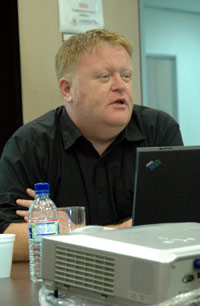 The impressive economic growth in China has attracted increasing interest in the country’s model of development, and has prompted discussion on the possibility of the Chinese model, also known as the Beijing Consensus, replacing the Washington Consensus as an alternative model for the developing world. The onset of the global financial crisis has further intensified the focus. However, there is also fear that the growing prominence of the Chinese model would disrupt the global liberal economic order. The impressive economic growth in China has attracted increasing interest in the country’s model of development, and has prompted discussion on the possibility of the Chinese model, also known as the Beijing Consensus, replacing the Washington Consensus as an alternative model for the developing world. The onset of the global financial crisis has further intensified the focus. However, there is also fear that the growing prominence of the Chinese model would disrupt the global liberal economic order.
Instead of focusing on what the model is, Prof. Shaun Breslin, Director of the Centre for the Study of Globalisation and Regionalisation at the University of Warwick and Visiting Senior Fellow in the RSIS Centre for NTS Studies, in this seminar, explores the model by identifying what it is not. For instance, it is not about an abrupt transition to a market economy, it is not about complete liberalisation and it is not about following a model or telling others to follow that model. By distancing itself from the previously laid down economic development plans, China is constructing an identity that is different from other dominant powers.
Click here for an audio-recording and notes of the seminar.
Seminar on ‘Non-traditional Security and New Modes of Security Governance
in Southeast Asia’
RSIS Centre for Non-Traditional Security (NTS) Studies
20 April 2011
Singapore
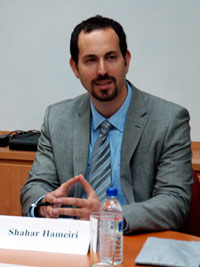 In this seminar, Dr Shahar Hameiri, Australian Research Council Post-doctoral Fellow and Lecturer in International Politics and Fellow of the Asia Research Centre, Murdoch University, aimed to address the dichotomy that currently exists between, on the one hand, the views of those who posit that the state’s role is withering away in the face of globalisation, and on the other, the views of those who reassert the state’s dominant role. He proposed a third, alternative approach, which focuses instead on the way states are being transformed under contemporary conditions. This perspective allows for the possibility that, while states have largely remained central agents of domestic governance and international politics, they are undergoing significant transformations which are conditioning how and what they govern, and how regimes of governance are emerging across states. In this seminar, Dr Shahar Hameiri, Australian Research Council Post-doctoral Fellow and Lecturer in International Politics and Fellow of the Asia Research Centre, Murdoch University, aimed to address the dichotomy that currently exists between, on the one hand, the views of those who posit that the state’s role is withering away in the face of globalisation, and on the other, the views of those who reassert the state’s dominant role. He proposed a third, alternative approach, which focuses instead on the way states are being transformed under contemporary conditions. This perspective allows for the possibility that, while states have largely remained central agents of domestic governance and international politics, they are undergoing significant transformations which are conditioning how and what they govern, and how regimes of governance are emerging across states.
In order to explore the nature and implications of contemporary state transformation, Dr Hameiri drew on non-traditional security (NTS) issues and explored the way in which NTS threats are governed – and how NTS threats and their governance feed off and further accelerate the transformation (or disaggregation) of the modern state. In particular, he examined processes of internationalisation, whereby elements of the state apparatus are becoming interlinked across territorial boundaries, representing the rescaling of modes of governance away from the national level. Ultimately, he suggested that new security challenges increasingly involve relocating security from the national arena to a range of new spatial and territorial arenas. Broadly speaking, locating the shifting nature of security in the context of state transformation allows for an explanation of the different ways in which security is governed.
Click here for the notes of the seminar.
Dialogue on ‘Rehabilitation of Returning Bangladeshi Migrant Workers from Libya’
Refugee and Migratory Movements Research Unit (RMMRU)
11 April 2011
Dhaka, Bangladesh
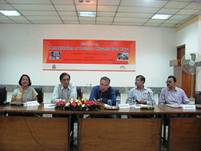 The need for a meaningful collaboration between the government, private sector and civil society to rehabilitate returned Bangladeshi migrants from Libya was underscored at a dialogue hosted by RMMRU on 11 April 2011. The need for a meaningful collaboration between the government, private sector and civil society to rehabilitate returned Bangladeshi migrants from Libya was underscored at a dialogue hosted by RMMRU on 11 April 2011.
The meeting brought together representatives from humanitarian agencies as well as the government, banking and private sectors to discuss various initiatives to assist Bangladeshi migrants who have recently returned from Libya. The tense security situation in Libya has meant that 35,000 migrant workers have fled the country and returned to Bangladesh.
Dr Tasneem Siddiqui, Chair of RMMRU, presented preliminary findings of an ongoing RMMRU survey of returned workers. The survey of 1,500 migrants revealed that about 85 per cent are yet to clear the debts they had incurred for finance migration. An overwhelming section favoured remigration. The dialogue came up with a number of suggestions to improve the situation of these returned migrants. Various bank loans, work schemes, employment opportunities in Bangladesh and abroad, as well as training programmes were among the strategies discussed. Secretary of the Ministry of Expatriates’ Welfare and Overseas Employment, Dr Zafar Ahmed Khan, who was present, said that the government will build on the recommendations of the dialogue.
RCSS Organises Energy and Water Security Working Group Sessions
of the Regional Network of Strategic Studies Centers (RNSSC)
Regional Centre for Strategic Studies (RCSS)
10–12 April 2011
Muscat, Oman
 Prof. Amal Jayawardane and Mr Chaminda Hettiarachchi, Executive Director and Associate Director of RCSS respectively, represented RCSS at the Energy and Water Security Working Group Sessions of the Regional Network of Strategic Studies Centers (RNSSC) of the National Defense University, which was held in Muscat, Oman from 10–12 April, 2011. The working groups will meet over a two-year period and develop strategies for overcoming energy security challenges for the countries of the Middle East and South Asia. During the meeting, participants discussed the concepts of energy and water security, identified key issues for respective countries and regions and outlined an agenda to be followed over subsequent sessions. The next working group session will be held in Ankara, Turkey in July 2011. Prof. Amal Jayawardane and Mr Chaminda Hettiarachchi, Executive Director and Associate Director of RCSS respectively, represented RCSS at the Energy and Water Security Working Group Sessions of the Regional Network of Strategic Studies Centers (RNSSC) of the National Defense University, which was held in Muscat, Oman from 10–12 April, 2011. The working groups will meet over a two-year period and develop strategies for overcoming energy security challenges for the countries of the Middle East and South Asia. During the meeting, participants discussed the concepts of energy and water security, identified key issues for respective countries and regions and outlined an agenda to be followed over subsequent sessions. The next working group session will be held in Ankara, Turkey in July 2011.
BIPSS Participates in ‘Bellagio Forum’
Bangladesh Institute of Peace and Security Studies (BIPSS)
April 2011
Bellagio, Italy
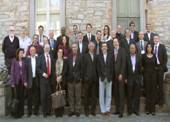 BIPSS President Major General Muniruzzaman (Retd) participated in the inaugural meeting of the ‘Bellagio Forum’ held at the Rockefeller Center in Bellagio, Italy. The Bellagio Forum was created to establish a World Security University under the aegis of the UN. The idea behind establishing such an institution arose in the wake of the 12th UN Congress held in Salvador, Brazil in 2010. This new university will focus on a multidisciplinary approach towards the study of security which will also encompass public security, human rights, media and security, criminal justice, and social communication, among others. The forum brought together noted security experts from around the world. BIPSS President Major General Muniruzzaman (Retd) participated in the inaugural meeting of the ‘Bellagio Forum’ held at the Rockefeller Center in Bellagio, Italy. The Bellagio Forum was created to establish a World Security University under the aegis of the UN. The idea behind establishing such an institution arose in the wake of the 12th UN Congress held in Salvador, Brazil in 2010. This new university will focus on a multidisciplinary approach towards the study of security which will also encompass public security, human rights, media and security, criminal justice, and social communication, among others. The forum brought together noted security experts from around the world.
Regional Seminar on ‘Citizens’ Assessment of Democracy’
Centre for the Study of Developing Societies (CSDS)
29–31 March 2011
Manila, Philippines
Dr Sanjay Kumar and Prof. Suhas Palshikar – from the Lokniti Programme for Comparative Democracy in CSDS – participated in the Regional Seminar on ‘Citizens’ Assessment of Democracy’ organised by International IDEA (Institute for Democracy and Electoral Assistance) and the National College of Public Administration and Governance on 29–31 March 2011. The seminar was attended by participants from 18 countries, which included countries planning to conduct democracy assessments. During the workshop, Mr Kumar and Prof. Palshikar shared their experiences in democracy assessment with other country representatives planning to undertake the project in the future and also spoke about how they plan to make improvements to their previous democracy assessment exercise in South Asia. Sanjay Kumar and Prof. Suhas Palshikar – from the Lokniti Programme for Comparative Democracy in CSDS – participated in the Regional Seminar on ‘Citizens’ Assessment of Democracy’ organised by International IDEA (Institute for Democracy and Electoral Assistance) and the National College of Public Administration and Governance on 29–31 March 2011. The seminar was attended by participants from 18 countries, which included countries planning to conduct democracy assessments. During the workshop, Mr Kumar and Prof. Palshikar shared their experiences in democracy assessment with other country representatives planning to undertake the project in the future and also spoke about how they plan to make improvements to their previous democracy assessment exercise in South Asia.
Seminar on ‘Will Arctic Warming Change the International Shipping Routes?’
RSIS Centre for Non-Traditional Security (NTS) Studies
22 March 2011
Singapore
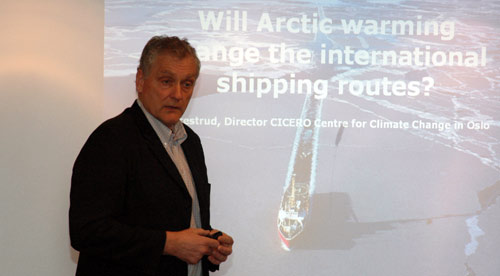 The Arctic is warming at twice the average rate of global warming. The impacts on the physical environment are clearly visible, one of which is that snow and ice are melting at an increasing rate. Sea ice is the main barrier for shipping in the Arctic. However, in the last 30 years, sea ice extent has reduced by 3–4 per cent per decade. The summer minimum extent (observed in September) has decreased much more – by more than 10 per cent in the last decade. The thickness and age of the ice – which includes the hardness – have also decreased. Models project that most of the summer ice will be gone by 2060–2080 and the shipping route via the Arctic Ocean between Europe and Japan/China would then be 10–12 days shorter than the conventional route. The Arctic is warming at twice the average rate of global warming. The impacts on the physical environment are clearly visible, one of which is that snow and ice are melting at an increasing rate. Sea ice is the main barrier for shipping in the Arctic. However, in the last 30 years, sea ice extent has reduced by 3–4 per cent per decade. The summer minimum extent (observed in September) has decreased much more – by more than 10 per cent in the last decade. The thickness and age of the ice – which includes the hardness – have also decreased. Models project that most of the summer ice will be gone by 2060–2080 and the shipping route via the Arctic Ocean between Europe and Japan/China would then be 10–12 days shorter than the conventional route.
In this talk, Dr Pål Prestrud, Director of the Center for International Climate and Environmental Research – Oslo (CICERO), discussed the implications of this situation for international shipping. He argued that, due to the existence of several challenges, it is unlikely that the Northern Sea Route (a term coined by the Russians; this route is also known as the Northeast Passage) will be commercially attractive in the next few decades. This presentation was based on the Arctic Marine Shipping Assessment (AMSA) conducted by the Arctic Council, a formal governmental forum established to promote cooperation among eight Arctic states. The presentation also drew from leading scientific findings on climate systems in the Arctic region.
Click here for an audio-recording and notes of the seminar.
Workshop on Initiative to Deal with Development and Inequality
Centre for the Study of Developing Societies (CSDS)
14–18 March 2011
Johannesburg, South Africa
 Dr Divya Vaid, together with four colleagues (from Argentina, Mexico, South Africa and Spain), participated in a workshop at the University of Witwatersrand, South Africa, on 14–18 March 2011, to plan and design a website and an online journal (to be launched in 2012) that deal with issues of development and inequality. To be led primarily by scholars based in the global south, this initiative has received initial funding from the Brown International Advanced Research Institutes´ (BIARI) Alumni Research Initiative, Brown University, US. Dr Divya Vaid, together with four colleagues (from Argentina, Mexico, South Africa and Spain), participated in a workshop at the University of Witwatersrand, South Africa, on 14–18 March 2011, to plan and design a website and an online journal (to be launched in 2012) that deal with issues of development and inequality. To be led primarily by scholars based in the global south, this initiative has received initial funding from the Brown International Advanced Research Institutes´ (BIARI) Alumni Research Initiative, Brown University, US.
Regional Conference on ‘Climate Change and Security’
Bangladesh Institute of Peace and Security Studies (BIPSS)
March 2011
Dhaka, Bangladesh
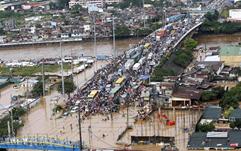 |
Flooding in Metro Manila |
BIPSS organised a three-day Regional Conference on ‘Climate Change and Security’ in March 2011. The conference forms part of the project/research study on ‘The Security Impact of Climate Change in Bangladesh and its Regional Neighbourhood’. Supported by the MacArthur Foundation, the project studies climate induced human displacement and migration in South Asia. The conference discussed and identified the causes and regional impacts of climate change in South Asia and attempted to identify the nexus between climate migration and conflict.
Click here for more information on BIPSS events.
International Workshop on
‘Global Environmental Migration: Bangladesh, Low Elevation Coastal Zones and Islands’
Refugee and Migratory Movements Research Unit (RMMRU)
3–4 February 2011
Dhaka, Bangladesh
 Discussions in the International Workshop on ‘Global Environmental Migration: Bangladesh, Low Elevation Coastal Zones and Islands’ emphasised the need for cooperation between science and policy, between emitters and those affected the most, and between scientists and researchers in different countries. It was observed that global environmental migration is a high profile, but also very controversial issue. It is one in which the state of scientific knowledge is still quite underdeveloped, where there are many misconceptions and a shortage of empirical evidence. This workshop was organised under the wider Foresight Project of the UK Government Office for Science in partnership with RMMRU. Discussions in the International Workshop on ‘Global Environmental Migration: Bangladesh, Low Elevation Coastal Zones and Islands’ emphasised the need for cooperation between science and policy, between emitters and those affected the most, and between scientists and researchers in different countries. It was observed that global environmental migration is a high profile, but also very controversial issue. It is one in which the state of scientific knowledge is still quite underdeveloped, where there are many misconceptions and a shortage of empirical evidence. This workshop was organised under the wider Foresight Project of the UK Government Office for Science in partnership with RMMRU.
Other participants in the discussions include Prof. Nigel Arnell, University of Reading; Dr Ainun Nishat, BRAC University; Prof. Graeme Hugo, University of Adelaide; Prof. Poh Poh Wong, National University of Singapore; as well as Dr Tasneem Siddiqui and Dr Chowdhury Abrar, RMMRU.
^ To the top
Recent Publications
The ASEAN Intergovernmental Commission on Human Rights and the Responsibility to Protect: Opportunities and Constraints
Asia Pacific Centre for the Responsibility to Protect (APR2P)
 Catherine Drummond, Working Paper on ASEAN and R2P, No. 2, 2011. Catherine Drummond, Working Paper on ASEAN and R2P, No. 2, 2011.
The ‘ASEAN Intergovernmental Commission on Human Rights and the Responsibility to Protect: Opportunities and Constraints’ report is the second in a two-part working paper series which builds upon the first report by assessing the potential opportunities to optimise the ASEAN Intergovernmental Commission on Human Rights’ (AICHR) Terms of Reference (TOR). Both reports assert that ASEAN and the AICHR have the responsibility to play a major role in protecting the region's peoples from mass atrocity crimes. By maximising the strengths of the Commission's TOR and by adopting a proposed hub-and-spoke model for coordination and assistance between the AICHR and ASEAN states, there is great potential for the increased promotion and protection of human rights in the region, as well as for the prevention of future mass atrocities. The report concludes with a detailed list of recommendations for the Commission, ASEAN, civil society and other stakeholders. |
|
Peace and Security Review
Bangladesh Institute of Peace and Security Studies (BIPSS)
 Book, Vol. 4, No. 7, 2011. Book, Vol. 4, No. 7, 2011.
This review published for the first quarter of 2011, includes articles titled ‘Transnational Security: Challenges and Threats Facing Bangladesh’, ‘A War of Terror – The Bail Bombing 2002’, ‘A Bengali Infantry Regiment in the Great War’, and ‘The Aspect of External Support in Insurgency/Terrorism & Proposed Regional Mechanism for Its Diffusion (The Nepalese Experience)’. |
|
Non-Traditional Security in Contemporary World
Centre for Non-Traditional Security and Peaceful Development Studies (Centre for NTS-PD Studies)
Books (Chinese translations), forthcoming.
The Centre for NTS-PD Studies in Zhejiang University will work with Zhejiang University Press to publish Chinese translations of ‘The Politics of Global Health Governance: United by Contagion’ (translated by Jiyong Jin), ‘Human Security and the UN: A Critical History’ (translated by Yan Zhang) and ‘The Evolution of International Security Studies’ (translated by Xiaofeng Yu). The first two books are scheduled for publication in July while the last is scheduled for publication in October. |
|
Food Security and Agricultural Changes in the Course of China's Urbanization
Institute of World Economics and Politics (IWEP)
 Ling Zhu, China & World Economy, Vol. 19, No. 2, pp. 40–59, 2011. Ling Zhu, China & World Economy, Vol. 19, No. 2, pp. 40–59, 2011.
China's small farmers face increasing challenges because of land and water resource constraints, and the effects of climate change. With the strengthened agricultural stimulus policies, poverty reduction and social protection programmes, as well as the expanding international food trade, China has to date achieved food security through small farm agriculture. Through the process of intensive economic restructuring, smallholders still co-exist with large-sized farms and industrialised agricultural businesses, but are in a vulnerable position in market transactions. Looking forward to 2050, China's agricultural development and food security policies should work to improve domestic market structures, further relax international trade control and empower smallholders. |
|
2nd Dissemination Meeting and Policy Roundtable on the Responsibility to Protect (RtoP)
RSIS Centre for Non-Traditional Security (NTS) Studies, Institute of Security and International Studies (ISIS 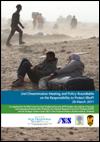 Thailand), the National Research Council of Thailand (NCRT) and the Strategic Studies Center (SSC) of the National Defence Studies Institute Thailand), the National Research Council of Thailand (NCRT) and the Strategic Studies Center (SSC) of the National Defence Studies Institute
Dissemination Meeting Report, May 2011.
The 2nd RtoP Dissemination Meeting and Policy Roundtable held in collaboration with ISIS Thailand, NCRT and SSC on 28 March 2011, was the second of two dissemination exercises to circulate the findings of the RtoP Study Group convened by the RSIS Centre for NTS Studies in 2009. The meeting aimed to introduce possible policy entry points for operationalising the RtoP in Asia, and more broadly, promote an understanding of the RtoP and assist in operationalising the norm in Asian policymaking. |
|
4th Annual Convention of the Consortium of NTS-Asia 2010
RSIS Centre for Non-Traditional Security (NTS) Studies for NTS-Asia
 Conference Report, May 2011. Conference Report, May 2011.
This report details the proceedings of the 4th Annual Convention of the Consortium of Non-Traditional Security Studies in Asia (NTS-Asia) that was held on 25–26 November 2010 in Singapore. As in previous years, the Annual Convention brought together all 20 NTS-Asia member institutes to take stock of salient NTS issues in the Asia-Pacific region. Topics that were discussed include climate change and security, food security, conflict prevention and resolution, global architecture and NTS, human rights and human security, and transnational crime. |
|
Securitising Food Futures in the Asia-Pacific: Human Securitising Regional Frameworks
RSIS Centre for Non-Traditional Security (NTS) Studies
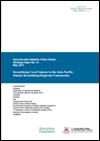 Lorraine Elliott, MacArthur Asia Security Initiative Policy Working Paper, No. 15, May 2011. Lorraine Elliott, MacArthur Asia Security Initiative Policy Working Paper, No. 15, May 2011.
The global food crisis of 2007 to 2008 and the uneven but almost certainly largely negative impacts of climate change have drawn attention to the importance of food security as a regional challenge for the Asia-Pacific. Regional strategies to achieve food security have to recognise the need to provide immediate remedial support to alleviate hunger and restore livelihoods, to enhance capacity to anticipate food uncertainties and to strengthen resilience to the impacts of future food disasters.
A human security approach seeks to ensure that people are at the centre of regional food security frameworks – not just in terms of concerns over who the food insecure or food vulnerable are, but also in terms of ensuring that policies and programmes respond to local needs and community rights and that food security governance is participatory and transparent. |
|
Establishing Good Security Sector Governance in Southeast Asia
RSIS Centre for Non-Traditional Security (NTS) Studies
 Herman Joseph S. Kraft, MacArthur Asia Security Initiative Policy Working Paper, No. 14, May 2011. Herman Joseph S. Kraft, MacArthur Asia Security Initiative Policy Working Paper, No. 14, May 2011.
The political and social systems in Southeast Asia have created varied conditions for security sector governance (SSG), each with its own sets of issues that need to be addressed. The inception of the ASEAN Charter has made democracy one of, if not the, principal goals of political development, creating a common ground for reforming SSG even in the face of the region's politically diverse character.
Outside of the Charter, SSG is equally important given the challenges posed by ongoing political transitions and democratisation among ASEAN's member states. While some member states have already transitioned from authoritarian, military-led regimes, each state's stability and ability to provide security – especially human security – remain fragile. The issues concerning the latter are played out in different political conditions, and their effects on intra- and inter-state relations reflect on the various ways SSG is implemented across the region. |
|
Legal Protection for Southeast Asian Migrant Domestic Workers: Why It Matters
RSIS Centre for Non-Traditional Security (NTS) Studies
 Pau Khan Khup Hangzo, Zbigniew Dumienski and Alistair D.B. Cook, NTS Insight, May 2011. Pau Khan Khup Hangzo, Zbigniew Dumienski and Alistair D.B. Cook, NTS Insight, May 2011.
Domestic work is often excluded from the protections afforded to migrant workers through national and international laws, and this has led to exploitation and abuse. This NTS Insight investigates the dynamics of the migrant-domestic-worker sector by examining the experiences of Filipino and Indonesian migrant domestic workers in Saudi Arabia and Malaysia. It explains why domestic work remains unrecognised and poorly regulated, reviews current protection measures and charts potential ways forward to address the most common protection needs of migrant domestic workers. |
|
Critical Reflections on Anti-human Trafficking: The Case of Timor-Leste
RSIS Centre for Non-Traditional Security (NTS) Studies
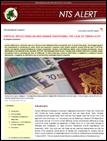 Zbigniew Dumienski, NTS Alert, Issue 2, May 2011. Zbigniew Dumienski, NTS Alert, Issue 2, May 2011.
Human trafficking is commonly seen as a heinous crime affecting millions of migrants from all parts of the globe. The struggle against this phenomenon is perceived as noble, moral and necessary. However, more careful research reveals that the story is far from simple, and that the concept of trafficking is highly problematic. Similarly, anti-trafficking efforts, while probably well-meaning, can be detrimental to the interests of the migrants. This NTS Alert highlights these issues, looking at the problem both from a broader, global perspective, and by presenting the case of 'trafficking' in Timor-Leste (also known as East Timor). In addition to a critique of current approaches, it suggests an alternative way of looking at the challenges faced by migrants. |
|
Recognising the Economic Relationship between Sex Workers and Sex Businesses
RSIS Centre for Non-Traditional Security (NTS) Studies
 Manpavan Kaur, NTS Alert, Issue 1, May 2011. Manpavan Kaur, NTS Alert, Issue 1, May 2011.
This NTS Alert discusses the economic relationship between sex workers and sex businesses in Southeast Asia in order to critically examine hitherto narrow interpretations which posit an integral link between sex work and sex trafficking. Economic motivations of the sex industry can induce the voluntary entry of sex workers into the industry. This undermines the presumption that all sex workers are ‘victims’ of trafficking. Hence, this NTS Alert highlights the importance of broadening the interpretation of sex work if the exploitation experienced by sex workers in Southeast Asia is to be adequately addressed. |
|
H1N1 – The Social Costs of Elite Confusion
RSIS Centre for Non-Traditional Security (NTS) Studies
 Bill Durodie, Journal of Risk Research, Vol. 8, No. 1, May 2011. Bill Durodie, Journal of Risk Research, Vol. 8, No. 1, May 2011.
In May 2011, the World Health Assembly would have received the report of its International Health Regulations Review Committee examining responses to the outbreak of the 2009 H1N1 pandemic influenza and identifying lessons to be learnt. This would have emphasised the need for better risk communication in future. But risk and communication are not objective facts; they are socially mediated cultural products. Responses to crises are not only simply determined by the situation at hand, but also through mental models developed over protracted periods. Accordingly, those responsible for advocating the precautionary approach and encouraging the securitisation of health, that both helped encourage a catastrophist outlook in this instance, are unlikely to be held to account. These elite confusions have come at an enormous cost to society. |
|
Regional Workshop on Dealing with Energy Vulnerabilities
RSIS Centre for Non-Traditional Security (NTS) Studies
 Conference Report, April 2011. Conference Report, April 2011.
Much literature on energy security in East Asia has focused on the dynamics of competition over resources, and how conflicts could arise from this. While this analytical perspective identifies potential risks and is conducive to the proposing of pre-emptive solutions to likely problems, it also risks precluding necessary attention to the possibilities of cooperation between states in the region.
This report comprises the proceedings of a regional workshop on energy security held on 9–10 December 2010. The workshop reviewed case studies of how countries in East Asia have managed to overcome their respective vulnerabilities and thus meet their energy needs. It aims to contribute to the exploration of cooperation-based solutions for addressing energy security in the region. |
|
Climate Insecurities: Exploring the Strategic Implications for Asia-Pacific Armed Forces
RSIS Centre for Non-Traditional Security (NTS) Studies
 Evan A. Laksmana, MacArthur Asia Security Initiative Policy Working Paper, No. 13, April 2011. Evan A. Laksmana, MacArthur Asia Security Initiative Policy Working Paper, No. 13, April 2011.
This paper seeks to explore and assess the implications of climate insecurities for the armed forces of the Asia-Pacific region, and in particular Southeast Asia. It identifies key issues and trends related to climate insecurities – in the areas of mass migration, diseases, natural disasters and the scarcity of water, food and other resources. It then details the implications for armed forces in the region with reference to the strategic, institutional and operational realms, and contends that climate change will become both a burden multiplier and a threat multiplier in the decades to come. |
|
Security Sector Governance and Conflict Management in Southeast Asia
Institute for Strategic and Development Studies (ISDS) and RSIS Centre for Non-Traditional Security (NTS)  Studies Studies
Mark E. delas Alas, Policy Brief, No. 10, April 2011.
SSG poses a huge challenge to states transitioning to democracy, particularly in cases where the military and other components of the security sector had been very influential in the conduct of government affairs. SSG is even more of a challenge in conflict-ridden societies where the state’s capacity to ensure internal security has been undermined. Democratic norms suggest that effective SSG involves not only the management of core security forces, but also competent civilian oversight. In addition, SSG programmes in Southeast Asia will have to recognise and address the specific realities and experiences of a particular country. This policy brief is based on the proceedings of the Second Study Group Meeting on ‘Security Sector Governance and Conflict Management in Southeast Asia’ organised by ISDS Inc., Philippines, in collaboration with the RSIS Centre for NTS Studies on 11 February 2011. |
|
Crafting Energy Security Cooperation in East Asia
RSIS Centre for Non-Traditional Security (NTS) Studies
 Jochen Prantl, Policy Brief, No. 9, April 2011. Jochen Prantl, Policy Brief, No. 9, April 2011.
Existing work on energy security tends to over-emphasise the prospect of competition and conflict over resources while under-exploring the promise of cooperation. This policy brief provides a framework for understanding energy security cooperation and highlights some building blocks for crafting such cooperation in East Asia. At present, instead of an integrated regime, issues related to energy security are addressed through a patchwork of loosely coupled rules, regulations and institutions, overlapping and sometimes competing, which amount to a regime complex. This policy brief stipulates that an energy security regime complex may have advantages over an integrated regime, most notably in terms of adaptability, flexibility and voice, features which are particularly pertinent in an environment of high vulnerability and uncertainty. |
|
Transporting Conflicts via Migratory Routes: A Social Network Analysis (SNA) of Uyghur International Mobilisation
RSIS Centre for Non-Traditional Security (NTS) Studies for NTS-Asia
 Yu-Wen Chen, NTS-Asia Research Paper, No. 5, April 2011. Yu-Wen Chen, NTS-Asia Research Paper, No. 5, April 2011.
Transnational activism of the Uyghur diaspora in promoting the rights of their kindred back in China has been the focus of attention of the academia, press and media alike. This paper is a preliminary attempt at visualising the connections between Uyghur diaspora organisations, their sympathisers, governments and news organisations. A Social Network Analysis (SNA) of four data sets that chronologically record the diaspora’s political activities from 2006 to 2009 was carried out towards this end. Results corroborate the widely held view that the World Uyghur Congress (WUC) and the well-known Uyghur leader, Rebiya Kadeer, play pivotal roles in mobilising Uyghur communities around the world. Uyghur American Association (UAA), which is active offline as well, emerges as a key information provider of Uyghur issues in cyberspace. |
|
Debating Geoengineering Governance: How It Matters to the Asia-Pacific Region
RSIS Centre for Non-Traditional Security (NTS) Studies
 Jochen Prantl, NTS Alert, Issue 2, April 2011. Jochen Prantl, NTS Alert, Issue 2, April 2011.
The debate on the risks and opportunities of geoengineering is currently gaining momentum. The Intergovernmental Panel on Climate Change is, for the first time, assessing the scientific basis as well as the potential impacts and side effects of geoengineering proposals in their Fifth Assessment Report, which is scheduled to be finalised in 2014. The Asia-Pacific region needs to participate in this debate. This NTS Alert highlights the climate change challenges in the Asia-Pacific and their likely impacts. It identifies three initial steps that may facilitate a discussion to investigate the potential role of geoengineering techniques in response to those challenges: regional consultations, scenario-building, and public and civil society engagement. |
|
Why We Need a Debate about Geoengineering Governance ... Now
RSIS Centre for Non-Traditional Security (NTS) Studies
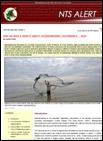 Jochen Prantl, NTS Alert, Issue 1, April 2011. Jochen Prantl, NTS Alert, Issue 1, April 2011.
Geoengineering techniques are currently experiencing a surge of interest, as it has become widely accepted that global warming is both real and potentially problematic. The historical failure to control emissions and the possibility that so-called tipping points in the Earth’s climate system are close to hand have generated a degree of urgency in efforts to research and implement potential solutions. The discourse has thus far been driven by scholarly communities in Europe and the US, and thus lacks perspectives from other key regions such as the Asia-Pacific. This has to change. As a region that may be significantly affected by climate change, Asia needs to have a voice in this emerging debate. |
|
Exploring the Contours of Democracy in the Maldives
Women in Security, Conflict Management and Peace (WISCOMP)
 Seema Kakran, Book, 2011. Seema Kakran, Book, 2011.
The Roundtable on ‘Exploring Contours of Democracy in Maldives’ was organised in 2010 as part of a WISCOMP series on Experiments with Democracy and Peacebuilding in South Asia. This initiative, over the last three years, has brought together policymakers, professionals from non-governmental organisations (NGOs), senior academics and young scholars with a view to deepen understanding on the nature of the structural constraints that operate in South Asian countries in terms of forging collective responses to the various challenges that they face, particularly in light of the growing democratic aspirations of the people.
This publication is based on the proceedings of the roundtable that provided a context to generate dialogue and understanding through the lens of the Maldivian experiences. The country has in some ways emerged as a harbinger of change in rewriting the scripts on the link between human security, democracy and the environment, especially since its transition to multi-party democracy. |
|
Building Constituencies of Peace Stakeholders in Dialogue XVIII: Symbol and Substance – Exploring Inter-Community Relations in Ladakh
Women in Security, Conflict Management and Peace (WISCOMP)
 Seema Kakran and Ashima Kaul, Report, 2011. Seema Kakran and Ashima Kaul, Report, 2011.
The series ‘Building Constituencies of Peace Stakeholders in Dialogue’ documents the proceedings of the substantive events and workshops organised by WISCOMP in Jammu and Kashmir as part of its decade-long Athwaas (‘handshake’ in Kashmiri) project in the state.
This report is based on the proceedings of the consultative workshop held in the shadow of the August 2010 flash floods in Leh, Ladakh. Participants of the workshop deliberated on the need for dialogue among Buddhists and Muslims from the region in the context of disaster management and sustainable development. |
|
Trust-Building in Contemporary Conflicts
Women in Security, Conflict Management and Peace (WISCOMP)
 WISCOMP CT Working Paper, No. XI, 2011. WISCOMP CT Working Paper, No. XI, 2011.
This paper is based on a Workshop on ‘Conflict Transformation’ organised by WISCOMP in March 2011. Designed and conducted by Prof. Nicholas J. Wheeler, Chair of the Department of International Politics at Aberystwyth University, Wales, UK, the workshop brought together a select group of young Indian scholars, practitioners and students to explore the growing literature on trust-building and its applicability to interstate and intrastate conflicts. |
|
Peace Network: Conflict Transformation Workshops’ Alumni 2001–2010
Women in Security, Conflict Management and Peace (WISCOMP)
 Directory, 2010. Directory, 2010.
This directory profiles the participants of the nine conflict transformation workshops conducted by WISCOMP. Over the years, WISCOMP has brought together young Indians and Pakistanis, and later those from other South Asian countries, for training in the field of conflict transformation. Apart from learning the theory and practice of conflict transformation, and acquiring skills in the methodologies of dialogue and negotiation, participants have forged bonds of trust and friendship which have led to the creation and growth of a close-knit network of people committed to non-violent social and political change. The directory aims to not only strengthen contacts among the wide and diverse alumni group, but also provide a networking resource for people working in the area of peacebuilding. |
|
Enriching Democratic Practice in South Asia: Possibilities from the Field of Peacebuilding
Women in Security, Conflict Management and Peace (WISCOMP)
 Manjrika Sewak, Book, 2010. Manjrika Sewak, Book, 2010.
In October 2010, WISCOMP brought together youth leaders from Afghanistan, India, Myanmar, Nepal, Sri Lanka and the US to discuss how peacebuilding theory could potentially nurture and enrich the practice of democracy. Participants included graduate students, media professionals, and representatives of non-profit organisations and research institutes, who have committed their professional lives to the reduction of human suffering and oppression. Drawing on the work that WISCOMP has done over the last 10 years in the area of conflict transformation, the workshop examined the potential impact that a trust- and relationship-centered process could have on democratic structures and investigated how such an approach could lead to the long-term goals of sustainable peace and democracy. This publication is based on the discussions and activities that took place during the workshop. |
|
WISCOMP – Athwaas Network of Peace Animators in Jammu and Kashmir
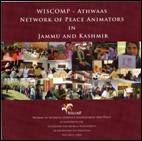 Women in Security, Conflict Management and Peace (WISCOMP) Women in Security, Conflict Management and Peace (WISCOMP)
Book, 2010.
This publication is a networking resource for peace practitioners and researchers from Jammu and Kashmir. It profiles a diverse group of young professionals, civil society activists, media persons and grassroots activists who have participated in the reconciliatory and transformative processes facilitated by WISCOMP through the Athwaas initiative. |
|
Harnessing the Development Potential of Aquatic Agricultural Systems for the Poor and Vulnerable
The WorldFish Center
 CGIAR Research Program 1.3. Brief, No. 2011-15, 2011. CGIAR Research Program 1.3. Brief, No. 2011-15, 2011.
Aquatic Agricultural Systems (AAS) are widely distributed along the world's rivers and coasts. These are generally highly productive systems but multiple constraints limit the ability of poor smallholder families to harness this productivity in the form of improved food, nutrition and income. To help overcome these constraints and harness the full development potential of AAS, a new action research programme has been developed by the Consultative Group on International Agricultural Research (CGIAR). This research programme brief highlights the key messages of this new initiative. |
|
More Meat, Milk and Fish by and for the Poor
The WorldFish Center
 CGIAR Research Program 3.7 – Fish, Brief, No. 2011-16 CGIAR Research Program 3.7 – Fish, Brief, No. 2011-16
As a member of CGIAR, the WorldFish Center will partner with several other CGIAR centres in the CGIAR Research Programme 3.7 on ‘More Meat, Milk and Fish by and for the Poor’. The focus of research for the fish components of the programme are on technology platform and integrated value chain research. Under this programme, the WorldFish Center will work to help achieve large-scale, environmentally sustainable increases in supply of fish to poor consumers on developing countries by focusing its research on developing new seed and feed technologies, understanding how to improve the institutional environment, and by testing an integrated value-chain approach to these issues in a limited number of countries (Egypt and Uganda). This brief details the programme’s action plan. |
|
Aquaculture (Vietnam country study)
The Worldfish Center
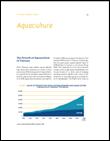 S.P. Kam, M.C. Badjeck, M. Phillips and R. Pomeroy, Economics of Adaptation to Climate Change, pp. 29–42, 2010. S.P. Kam, M.C. Badjeck, M. Phillips and R. Pomeroy, Economics of Adaptation to Climate Change, pp. 29–42, 2010.
This report provides a synthesis of key findings of sector studies undertaken in Vietnam in the context of the Economics of Adaptation to Climate Change (EACC) study. Sectors studied include agriculture, forestry, coastal ports and aquaculture. Aquaculture, especially in the Mekong River Delta, is an important source of employment and rural income. The main impacts of climate change on aquaculture seem likely to be a consequence of increased flooding and salinity. |
|
Aquaculture for the Poor in Cambodia
The WorldFish Center
 O. Joffre, Y. Kura, J. Pant and S. Nam, Brief, 2010. O. Joffre, Y. Kura, J. Pant and S. Nam, Brief, 2010.
This brief reviewed the current status of aquaculture in Cambodia. It primarily covers inland fish farming development and coastal aquaculture projects targeted at poverty alleviation and food security. It focuses on approaches aimed at developing low cost systems, and less on high input aquaculture systems that are usually inaccessible to poor families. |
|
Climate Change, Water and Agriculture in the Greater Mekong Subregion
International Water Management Institute
 R. Johnston, G. Lacombe, C.T. Hoanh, A. Noble, P. Pavelic, V. Smakhtin, D. Suhardiman, S.P. Kam and P.S. Choo, Report, 2010. R. Johnston, G. Lacombe, C.T. Hoanh, A. Noble, P. Pavelic, V. Smakhtin, D. Suhardiman, S.P. Kam and P.S. Choo, Report, 2010.
The report reviews the current status and trends in water management in the Greater Mekong Subregion (GMS), assesses likely impacts of climate change on water resources in 2050 based on historical patterns and simulated projections, examines water management strategies in the context of climate and other changes, and identifies priority actions for governments and communities to improve resilience of the water sector and safeguard food production. |
|
The Future is Now: How Scenarios Can Help Senegalese and Mauritanian Fisheries Adapt to Climate Change
The Worldfish Center
 M.C. Badjeck and N. Diop, Nature & Faune, Vol. 25, No. 1, pp. 62–8, 2010. M.C. Badjeck and N. Diop, Nature & Faune, Vol. 25, No. 1, pp. 62–8, 2010.
Localised changes in the productivity of marine and inland waters induced by climate change will pose new challenges to the fishery and the aquaculture sectors in West Africa. However, climate change does not occur in isolation of other drivers of change; processes of environmental, economic and social change can affect the fishery sector, potentially creating additional vulnerability to climate change. Scenarios are a useful tool to explore uncertainties and understand non-climatic drivers of change. Despite their prevalence in global environmental change research, few have focused on the fisheries sector. This article presents the construction of fisheries sector scenarios for Senegal and Mauritania required for the analysis of climate change adaptation policies. |
^ To the top
Commentaries and Other News Articles
Regional Processing or Trading Refugees?
Gerhard Hoffstaedter, New Mandala, 10 May 2011
More Muslim Researchers in RSIS (in Malay)
Oleh Nur’Adilah Mahbob, Berita Harian, 13 May 2011
Water Disputes in South Asia: Can the Region Come Together?
Arpita Mathur, RSIS Commentaries, No. 72, 4 May 2011
China's Food Security: Questioning the Numbers
Zhang Hongzhou, RSIS Commentaries, No. 71, 4 May 2011
Transnational Crime in the Fishing Industry: Asia's Problem?
Euan Graham, RSIS Commentaries, No. 62, 25 April 2011
After Japan: Waiting for Asia's Next Big One
Yang Razali Kassim, RSIS Commentaries, No. 57, 12 April 2011
Nuclear Power after Fukushima
Barry Desker, RSIS Commentaries, No. 53, 6 April 2011
Urban Search and Rescue: Boosting Intra-ASEAN Self Help
Nah Liang Tuang, RSIS Commentaries, No. 52, 4 April 2011
^ To the top |